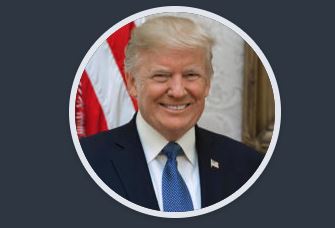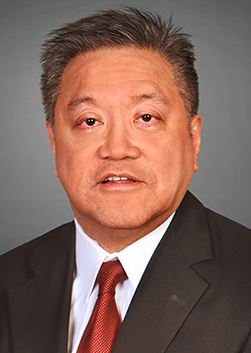Trump Permanently Blocks $117 Billion Broadcom Bid For Qualcomm
President Trump brought Broadcom's attempted hostile takeover of Qualcomm to a screeching halt Monday evening. Citing national security concerns, Trump signed an order blocking Broadcom's unsolicited $117 billion bid for Qualcomm, which would have been the largest merger in semiconductor history.
Trump's move isn't unprecedented, but it is rare. Trump also blocked another attempted acquisition in September 2017 when he stopped the $1.3 billion takeover of U.S.-based Lattice Semiconductor by Canyon Bridge Capital Partners, which was backed by Chinese investment firms. At the time, it was only the fourth time in 27 years that a U.S. President had personally blocked a business takeover by a foreign company.
Trump's Broadcom order is both immediate and permanent. Trump based the order on a recommendation from an ongoing review of the bid by the Committee for Foreign Investment in the United States (CFIUS), which investigates the national security implications of transactions that transfer control of a U.S. business to a foreign entity. The committee was widely expected to eventually scuttle the proposed Qualcomm takeover due to objections from the Department of Defense.
Broadcom's swashbuckling CEO Hock Tan is known for his acquisitions of LSI, PLX Technologies, Emulex, Broadcom, and Brocade. Tan promised in November 2017 to repatriate Broadcom to the United States from Singapore. That process was expected to finish next month. Broadcom's proposed move reportedly convinced the Treasury Department to support the Qualcomm purchase, but from the wording of the order, it appears that re-domiciling would not have an impact on Trump's decision. It will be interesting to see if Broadcom will complete the repatriation process.
Many proposed mergers come to an end during CFIUS review, which often makes it clear to participants if the bid is unlikely to succeed (much like Chinese Unisplendour’s attempted investment in WD).
Qualcomm now continues its own process of attempting to maneuver its ongoing $44 billion bid for NXP, another semiconductor vendor, through MOFCOM, which is China's rough equivalent to CFIUS.
China's MOFCOM is also notorious for either blocking or meting out restrictive long-term measures on acquisitions. The CFIUS and MOFCOM maneuvers are often viewed as politically motivated. Given Trump's 25% steel tariffs aimed at China's steel industry, it's logical to expect heightened regulatory activity between the two countries in the future.
Get Tom's Hardware's best news and in-depth reviews, straight to your inbox.
Broadcom is also known for raising the prices of products after it purchases a company, such as its notorious price hikes on PCIe switches after the company cornered the market when it purchased PLX Technologies in 2014. Broadcom quadrupled the price of some switches overnight, which some have attributed to increased motherboard pricing and the slow uptake of NVMe storage devices in the data center. It's unclear if concerns about similar activities with Qualcomm's contracts with the U.S. military were a factor in Trump's decision.
All of this is also great news for Intel, which was rumored to be considering a range of options if the Broadcom/Qualcomm takeover was successful. Those options reportedly included purchasing Broadcom, which might have been a necessary move to prevent the formation of a powerful new foe in both the mobile and data center segments.
Trump's order comes amid Broadcom's attempt to install 15 new Qualcomm board members, all of whom are now blocked by the order from standing for election. Trump's order also states that "the Purchaser and Qualcomm shall immediately and permanently abandon the proposed takeover" and outlines several other requirements, as stated below:
Upon review of a recommendation from the Committee on Foreign Investment in the United States and consideration, as appropriate, of the factors set forth in the Defense Production Act of 1950, as amended, the President has made relevant findings and issued the following Order:ORDERREGARDING THE PROPOSED TAKEOVER OF QUALCOMM INCORPORATED BY BROADCOM LIMITEDBy the authority vested in me as President by the Constitution and the laws of the United States of America, including section 721 of the Defense Production Act of 1950, as amended (section 721), 50 U.S.C. 4565, it is hereby ordered as follows:Section 1. Findings. (a) There is credible evidence that leads me to believe that Broadcom Limited, a limited company organized under the laws of Singapore (Broadcom), along with its partners, subsidiaries, or affiliates, including Broadcom Corporation, a California corporation, and Broadcom Cayman L.P., a Cayman Islands limited partnership, and their partners, subsidiaries, or affiliates (together, the Purchaser), through exercising control of Qualcomm Incorporated (Qualcomm), a Delaware corporation, might take action that threatens to impair the national security of the United States; and(b) Provisions of law, other than section 721 and the International Emergency Economic Powers Act (50 U.S.C. 1701 et seq.), do not, in my judgment, provide adequate and appropriate authority for me to protect the national security in this matter.Sec. 2. Actions Ordered and Authorized. On the basis of the findings set forth in section 1 of this order, considering the factors described in subsection 721(f) of the Defense Production Act of 1950, as appropriate, and pursuant to my authority under applicable law, including section 721, I hereby order that:(a) The proposed takeover of Qualcomm by the Purchaser is prohibited, and any substantially equivalent merger, acquisition, or takeover, whether effected directly or indirectly, is also prohibited.(b) All 15 individuals listed as potential candidates on the Form of Blue Proxy Card filed by Broadcom and Broadcom Corporation with the Securities and Exchange Commission on February 20, 2018 (together, the Candidates), are hereby disqualified from standing for election as directors of Qualcomm. Qualcomm is prohibited from accepting the nomination of or votes for any of the Candidates.(c) The Purchaser shall uphold its proxy commitments to those Qualcomm stockholders who have returned their final proxies to the Purchaser, to the extent consistent with this order.(d) Qualcomm shall hold its annual stockholder meeting no later than 10 days following the written notice of the meeting provided to stockholders under Delaware General Corporation Law, Title 8, Chapter 1, Subchapter VII, section 222(b), and that notice shall be provided as soon as possible.(e) The Purchaser and Qualcomm shall immediately and permanently abandon the proposed takeover. Immediately upon completion of all steps necessary to terminate the proposed takeover of Qualcomm, the Purchaser and Qualcomm shall certify in writing to the Committee on Foreign Investment in the United States (CFIUS) that such termination has been effected in accordance with this order and that all steps necessary to fully and permanently abandon the proposed takeover of Qualcomm have been completed.(f) From the date of this order until the Purchaser and Qualcomm provide a certification of termination of the proposed takeover to CFIUS pursuant to subsection (e) of this section, the Purchaser and Qualcomm shall certify to CFIUS on a weekly basis that they are in compliance with this order and include a description of efforts to fully and permanently abandon the proposed takeover of Qualcomm and a timeline for projected completion of remaining actions.(g) Any transaction or other device entered into or employed for the purpose of, or with the effect of, avoiding or circumventing this order is prohibited.(h) If any provision of this order, or the application of any provision to any person or circumstances, is held to be invalid, the remainder of this order and the application of its other provisions to any other persons or circumstances shall not be affected thereby. If any provision of this order, or the application of any provision to any person or circumstances, is held to be invalid because of the lack of certain procedural requirements, the relevant executive branch officials shall implement those procedural requirements.(i) This order supersedes the Interim Order issued by CFIUS on March 4, 2018.(j) The Attorney General is authorized to take any steps necessary to enforce this order.Sec. 3. Reservation. I hereby reserve my authority to issue further orders with respect to the Purchaser and Qualcomm as shall in my judgment be necessary to protect the national security of the United States.Sec. 4. Publication and Transmittal. (a) This order shall be published in the Federal Register.(b) I hereby direct the Secretary of the Treasury to transmit a copy of this order to Qualcomm and Broadcom.DONALD J. TRUMPTHE WHITE HOUSE,March 12, 2018.

Paul Alcorn is the Editor-in-Chief for Tom's Hardware US. He also writes news and reviews on CPUs, storage, and enterprise hardware.
-
bit_user Reply
Even if you don't like him, it doesn't mean you have to disagree with 100% of what he does. Whether you like or dislike a president, they're likely to do a least a few things with which you disagree or agree.20789211 said:Thank God for our GREATEST PRESIDENT.
If the acquisition hurts Qualcomm's chances of establishing the next 5G standard, relative to Chinese SEOs, I think blocking it was a good move. And Qualcomm already has enough (too much?) clout in the market - they don't need to be yet bigger. -
littleleo I'm not a Trump fan, but for all of us in the USA I hope he does well. If he fails the USA fails. And of course late night has never been as entertaining since he got in office. Can't wait for SNL this weekend.Reply -
littleleo Yeah, Japan loved it now they are the leading force behind it and showed the world that the USA isn't as important as it thinks it is to world trade agreements. Yeah that is really great for the USA.Reply -
mrmez Kind of agree with this.Reply
Happening in AUS too. Many companies are quietly being bought by (mostly) Chinese organisations.
Happened to one of our competitors, and especially prevalent with farms. Kinda scary seeing more and more of our food isn't even owned by us. -
mihen This move by Broadcom could only happen due to Apple's retaliation on the company for perfectly legal business practices. Then delaying judgement as long as possible.Reply
Even with Qualcomm's weakened position, it's still a much bigger company than Broadcom. There was no way Broadcom could pony up the money Qualcomm would want. They didn't even reach half of what Qualcomm would consider a reasonable offer. This is why they attempted a hostile take-over. -
therealduckofdeath I agree with Mihen that this whole affair looked shady as fudge. As the saying goes, even a broken clock is right twice a day. Lucky Qualcomm that it happened to be one of those two. :)Reply -
mrmez Apple must be the most powerful company is history then.Reply
QC had been fined (so far)...
~$1B fine from South Korea
~$1B fine from the EU
What will probably be $1B fine heating up in the USA
Read into it a little more. QC charges Apple based on the cost of their phone. Ie: A modem in a 64Gb phone costs less than a modem in a 256Gb phone. Sound fair?
Imagine pulling into McDonalds and getting charged $50 for a burger because you drive a Ferrari. What the actual fuuuu???

